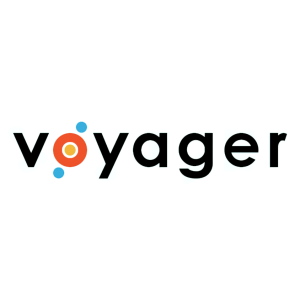Voyager Selects Tau Silencing Gene Therapy Development Candidate for Alzheimer’s Disease
Rhea-AI Summary
Voyager Therapeutics (VYGR) has selected VY1706 as its lead development candidate for tau silencing gene therapy in Alzheimer's disease. The company plans to file IND and CTA applications in 2026. VY1706 combines siRNA technology to reduce tau expression with an IV-delivered TRACER capsid that can penetrate the blood-brain barrier. In non-human primate studies, a single VY1706 dose achieved 50% to 73% reduction in tau mRNA levels across the cerebral cortex, particularly in areas where tau accumulates during Alzheimer's progression. This marks the fifth neuro gene therapy development candidate using Voyager's TRACER capsids.
Positive
- Significant tau reduction (50-73%) demonstrated in non-human primate studies
- VY1706 represents the company's fifth neuro gene therapy development candidate
- Single-dose administration shows effectiveness in targeting key brain areas
Negative
- IND and CTA filings not planned until 2026, indicating lengthy development timeline
- Currently only preclinical data available, with human trials yet to begin
News Market Reaction 1 Alert
On the day this news was published, VYGR gained 1.71%, reflecting a mild positive market reaction.
Data tracked by StockTitan Argus on the day of publication.
- Candidate VY1706 demonstrates significant reductions of tau at low doses in NHP study; IND and CTA filings anticipated in 2026 -
- VY1706 is the fifth neuro gene therapy development candidate nominated leveraging Voyager’s IV-delivered, CNS-penetrant TRACER capsids -
LEXINGTON, Mass., Nov. 20, 2024 (GLOBE NEWSWIRE) -- Voyager Therapeutics, Inc. (Nasdaq: VYGR), a biotechnology company dedicated to advancing neurogenetic medicines, today announced that it has selected a lead development candidate, VY1706, for its tau silencing gene therapy program in Alzheimer’s disease. The Company anticipates filing an investigational new drug (IND) application with the U.S. Food and Drug Administration and a clinical trial application (CTA) with Health Canada for VY1706 in 2026.
VY1706 combines a potent siRNA construct to decrease the expression of tau with an IV-delivered, blood-brain barrier-penetrant TRACER™ capsid. In a non-human primate (NHP) study, a single dose of VY1706 resulted in reductions in tau mRNA levels of
“The nomination of this tau silencing development candidate VY1706, along with the ongoing clinical trial of our anti-tau antibody VY7523, demonstrate our conviction that tau is an important target in Alzheimer’s disease,” said Toby Ferguson, M.D., Ph.D., Chief Medical Officer of Voyager. “We have seen third-party data indicating that both a tau antibody and a tau knockdown approach can impact tau accumulation in a human brain, and that this may correlate with clinical benefit. We will continue to assess and learn from emerging data in this field as we efficiently progress our differentiated tau antibody and tau gene therapy programs towards human proof-of-concept.”
About Alzheimer’s Disease
Alzheimer’s disease is a progressive neurodegenerative disease estimated to affect 7 million people in the U.Si and up to 416 million people globallyii. The disease causes memory loss and may escalate to decreased independence, communication challenges, behavioral disorders such as paranoia and anxiety, and lack of physical controliii. In 2023, the total cost of caring for people living with Alzheimer’s and other dementias in the U.S. was estimated at
About the TRACER™ Capsid Discovery Platform
Voyager’s TRACER™ (Tropism Redirection of AAV by Cell-type-specific Expression of RNA) capsid discovery platform is a broadly applicable, RNA-based screening platform that enables rapid discovery of novel AAV capsids to enable gene therapy. Voyager has leveraged TRACER to create multiple families of novel capsids that, following intravenous delivery in preclinical studies, harness the extensive vasculature of the central nervous system (CNS) to cross the blood-brain barrier and transduce a broad range of CNS regions and cell types. In cross-species preclinical studies (rodents and multiple non-human primate species), intravenous delivery of TRACER-generated capsids resulted in widespread payload expression across the CNS at relatively low doses, enabling selection of multiple development candidates in Voyager’s wholly-owned and partnered gene therapy programs for neurologic diseases.
About Voyager Therapeutics
Voyager Therapeutics, Inc. (Nasdaq: VYGR) is a biotechnology company dedicated to leveraging the power of human genetics to modify the course of – and ultimately cure – neurological diseases. Our pipeline includes programs for Alzheimer’s disease, amyotrophic lateral sclerosis (ALS), Parkinson’s disease, and multiple other diseases of the central nervous system. Many of our programs are derived from our TRACER™ AAV capsid discovery platform, which we have used to generate novel capsids and identify associated receptors to potentially enable high brain penetration with genetic medicines following intravenous dosing. Some of our programs are wholly owned, and some are advancing with partners including Alexion, AstraZeneca Rare Disease; Novartis Pharma AG; Neurocrine Biosciences, Inc.; and Sangamo Therapeutics, Inc. For more information, visit www.voyagertherapeutics.com.
Voyager Therapeutics® is a registered trademark, and TRACER™ is a trademark, of Voyager Therapeutics, Inc.
Forward-Looking Statements
This press release contains forward-looking statements for the purposes of the safe harbor provisions under The Private Securities Litigation Reform Act of 1995 and other federal securities laws. The use of words such as “expect,” “anticipate,” “potential,” “may,” or “continue,” and other similar expressions are intended to identify forward-looking statements.
For example, all statements Voyager makes regarding Voyager’s ability to advance its AAV-based gene therapy programs and tau antibody program, including expectations for Voyager’s achievement of preclinical and clinical development milestones for its potential development candidates, such as the identification of lead development candidates, IND and CTA filings, the initiation of clinical trials, clinical trial enrollment, and the generation of clinical data and proof-of-concept; Voyager’s expectations for the presentation of additional data from its tau silencing gene therapy development candidate at a future scientific conference; the potential for an antibody or gene therapy targeting tau to impact tau accumulation in a human brain and for this impact to correlate to clinical benefit; and the potential for third-party clinical data to inform Voyager’s clinical development plans are forward looking.
All forward-looking statements are based on estimates and assumptions by Voyager’s management that, although Voyager believes such forward-looking statements to be reasonable, are inherently uncertain and subject to risks and uncertainties that may cause actual results to differ materially from those that Voyager expected. Such risks and uncertainties include, among others, the expectations and decisions of regulatory authorities; the timing, initiation, conduct and outcomes of Voyager’s preclinical and clinical studies; the availability of data from clinical trials; the availability or commercial potential of product candidates under collaborations; the success of Voyager’s product candidates; the willingness and ability of Voyager's collaboration partners to meet obligations under collaboration agreements with Voyager; the continued development of Voyager’s technology platforms, including Voyager’s TRACER platform and its antibody screening technology; Voyager’s scientific approach and program development progress, and the restricted supply of critical research components; the development by third parties of capsid identification platforms that may be competitive to Voyager’s TRACER capsid discovery platform; Voyager’s ability to create and protect intellectual property rights associated with the TRACER capsid discovery platform, the capsids identified by the platform, and development candidates for Voyager’s pipeline programs; the possibility or the timing of Voyager’s receipt of program reimbursement, development or commercialization milestones, option exercise, and other payments under Voyager’s existing licensing or collaboration agreements; the ability of Voyager to negotiate and complete licensing or collaboration agreements with other parties on terms acceptable to Voyager and the third parties; the success of programs controlled by third-party collaboration partners in which Voyager retains a financial interest; the ability to attract and retain talented directors, employees, and contractors; and the sufficiency of Voyager’s cash resources to fund its operations and pursue its corporate objectives.
These statements are also subject to a number of material risks and uncertainties that are described in Voyager’s most recent Annual Report on Form 10-K filed with the Securities and Exchange Commission. All information in the press release is as of the date of this press release, and any forward-looking statement speaks only as of the date on which it was made. Voyager undertakes no obligation to publicly update or revise this information or any forward-looking statement, whether as a result of new information, future events or otherwise, except as required by law.
Contacts
Trista Morrison, NACD.DC, tmorrison@vygr.com
Investors: Michael Hencke, mhencke@kendallir.com
Media: Brooke Shenkin, brooke@scientpr.com
References:
i. Alzheimer’s Association. 2023 Alzheimer’s Facts and Figures. Available at: https://www.alz.org/media/Documents/alzheimers-facts-and-figures.pdf. Accessed November 12, 2024.
ii. Gustavsson A, Norton N, Fast T, et al. Global estimates on the number of persons across the Alzheimer’s disease continuum. Alzheimer’s Dement. 2023; 19: 658–670. doi: 10.1002/alz.12694.
iii. Penn Medicine. The 7 Stages of Alzheimer’s Disease. Available at: https://www.pennmedicine.org/updates/blogs/neuroscience-blog/2019/november/stages-of-alzheimers. Accessed November 12, 2024.
iv. USAgainstAlzheimer’s. The Alzheimer’s Disease Crisis – By the Numbers. Available at: The Alzheimer’s Disease Crisis – By the Numbers | UsAgainstAlzheimer’s (usagainstalzheimers.org). Accessed: November 12, 2024.









